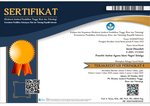Pancasila Philosophy and Its Contribution to the Development of Golden Indonesia 2045
Abstract
Keywords
Full Text:
PDFReferences
Anggoro, F N. (2023, March 31). Reformulation of State Properties as A Guideline for The Direction of Indonesia's National Development. , 2(1), 31-41. https://doi.org/10.36448/cls.v2i2.48
Arifin, S., Anisa, N A., Siswohadi, S., Megasari, A D., & Darim, A. (2020, June 11). The Effect of Consumption On The Society Welfare In Sampang District. , 1(2), 166-170. https://doi.org/10.35877/454ri.qems88
Basri, M C., Rahardja, S., & Fitrania, S N. (2016, June 1). Not a Trap, But Slow Transition? Indonesia's Pursuit to High Income Status. The MIT Press, 15(2), 1-22. https://doi.org/10.1162/asep_a_00422
Chammearc, H B., & Astuty, P. (2023, June 9). The Effect Of Investment, Work Force, And Education Level On The Real Growth Of GRDP In The Bangka Belitung Islands. , 2(11), 2580-2588. https://doi.org/10.59141/jrssem.v2i11.472
Harahap, H., Sihombing, B., & Hamid, A. (2020, October 30). Impact of the Omnibus Law/Job Creation Act in Indonesia. , 8(`10), 266-281. https://doi.org/10.18535/ijsrm/v8i10.lla01
Hidayah, Y., Simatupang, E., & Belladonna, A P. (2022, October 4). Pembudayaan Nilai-nilai Pancasila dalam Konsep Etika Ruang Digital di Era Post-Pandemi. , 2(2), 208-215. https://doi.org/10.52738/pjk.v2i2.91
Ibrahim, D. (2021, January 1). Educational Values of Indonesian Character Education in Sharia Maqasid Perspective. https://doi.org/10.2991/assehr.k.210715.004
Ichwal, M., & Sapriya, S. (2022, January 1). Strengthening the Organization of the Aliansi Indonesia Damai in Internalizing Peace Values. https://doi.org/10.2991/assehr.k.220108.044
Johan, T S B. (2020, January 1). International World Recognition on Indonesias Success in Creating Tolerance of Religion. https://doi.org/10.2991/assehr.k.201017.159
Jones, G W. (1976, October 1). Religion and Education in Indonesia. , 22, 19-19. https://doi.org/10.2307/3350976
Juanda, O., & Juanda, J. (2023, February 10). The Ideal Law State Concept in Indonesia; The Reality and The Solution. , 3(2), 251-262. https://doi.org/10.38035/jlph.v3i2.172
Jundiani, J. (2018, July 24). Local Wisdom in the Environmental Protection and Management. IOP Publishing, 175, 012130-012130. https://doi.org/10.1088/1755-1315/175/1/012130
Kawangung, Y. (2019, April 25). Religious moderation discourse in plurality of social harmony in Indonesia. , 3(1), 160-170. https://doi.org/10.29332/ijssh.v3n1.277
Latifiani, D. (2020, October 30). Renewal of The National Contract Law. , 8(2), 137-150. https://doi.org/10.14710/jhp.8.2.137-150
Madril, O. (2020, February 2). The Authority of Administrative Court in Settling The Disputes Over Election Process in Indonesia. Sebelas Maret University, 8(3), 365-365. https://doi.org/10.20961/yustisia.v8i3.35553
Maunah, A. (2022, July 31). Radicalism Among Indonesias Young Generation: How to Overcome It?. Jurusan Ilmu Komputer Universitas Negeri Semarang, 1(2), 247-266. https://doi.org/10.15294/ijctns.v1i2.59803
Muhlashin, I. (2021, June 29). Negara Hukum, Demokrasi dan Penegakan Hukum di Indonesia. , 8(1), 87-100. https://doi.org/10.24252/al-qadau.v8i1.18114
Mulyono, K B. (2021, June 30). Decision Model for Saving Stocks Based on TPB and Financial Literacy. State University of Semarang, 16(1), 94-102. https://doi.org/10.15294/dp.v16i1.29164
Naim, M. (2017, July 11). The Role of The Appreciation of History Education, the Internalization of Pancasila Ideology and Religious Values on Creating the Nationalism Attitude. Universitas Pendidikan Indonesia Press, 13(2), 177-177. https://doi.org/10.17509/historia.v13i2.6211
Notowidigdo, M. (1958, July 1). An Indonesian Policy Aimed at Maintaining Freedom and Promoting World Peace. SAGE Publishing, 318(1), 43-48. https://doi.org/10.1177/000271625831800107
Setiawan, K., Ninawati., & Suparman, M Y. (2020, January 1). Learning Pancasila Through Snakes and Ladders Game. https://doi.org/10.2991/assehr.k.200515.058
Simaremare, T P., Muchtar, S A., & Halimi, M. (2020, January 1). Implementation Strengthening Religious Character Through Devotional Program in Civic Education. https://doi.org/10.2991/assehr.k.200320.066
Sinaga, E J. (2022, July 28). Implementation of Regulatory Policy in Government Agency. , 16(2), 323-323. https://doi.org/10.30641/kebijakan.2022.v16.323-340
Soewignyo, F., & Soewignyo, T I. (2015, March 31). The Influence of Talent Factors on Business Performance. Sebelas Maret University, 9(1), 76-76. https://doi.org/10.22164/isea.v9i1.100
Solin, S M., & Hasugian, L. (2021, April 23). Grounding Pancasila Values as Nusantara Character Building. , 4(4), 70-70. https://doi.org/10.20961/shes.v4i4.50588
Sugito, N., Aulia, R., & Rukmana, L. (2021, January 1). Pancasila as the Establishing Ideology of Nationalism Indonesian Young Generation. https://doi.org/10.2991/assehr.k.210204.027
Suparman, E. (2020, January 1). National Legal Development Regarding Illegal Business Impact Toward Society. https://doi.org/10.2991/aebmr.k.200513.126
Tirza, J., & Cendana, W. (2023, March 30). Social Media as an Appliance to Pancasila Education for the Young Generation. , 12(1), 183-190. https://doi.org/10.33395/jmp.v12i1.12332
Wahid, S H., & Mahsun, H M. (2021, March 27). Implication Juridical Decision of The Constitutional Court No. 18/PUU-XVII/2019 Concerning Wanprestasi In the Fiducia Agreement. , 3(1), 12-21. https://doi.org/10.32996/ijlps.2021.3.1.3
Wibowo, W. (2020, April 30). Merefleksi Demokrasi Pasca Pilpres 2019 dalam Mewujudkan Kesejahteraan Umum. Brawijaya University, 4(1), 67-80. https://doi.org/10.21776/ub.waskita.2020.004.01.6
Wijaya, T H D., & Halim, P. (2020, January 1). Punishment on Criminal Law Reform in Indonesia. https://doi.org/10.2991/aebmr.k.200226.007
Yumarma, A. (2011, October 1). Ethical foundations for peaceful coexistence A cultural investigation of keselarasan. University of Indonesia, 13(2), 305-305. https://doi.org/10.17510/wjhi.v13i2.26
DOI: https://doi.org/10.18326/dinamika.v5i1.81-104
Refbacks
- There are currently no refbacks.
Copyright (c) 2024 Zein Muchamad Masykur

This work is licensed under a Creative Commons Attribution-ShareAlike 4.0 International License.








